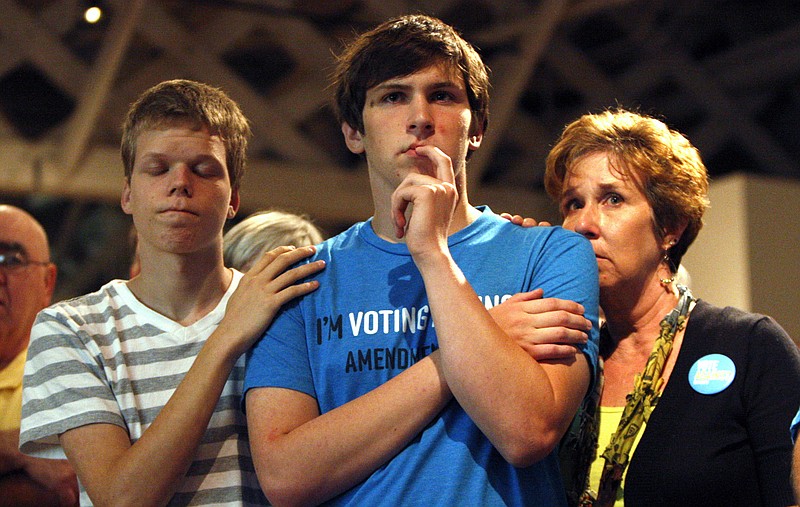WASHINGTON (AP) - Six-term Indiana Sen. Richard Lugar was routed by the right flank of his own Republican Party Tuesday night, and North Carolina voters decided overwhelmingly to strengthen their state's gay marriage ban - a conservative show of enthusiasm and strength six months before the nation chooses between Democratic President Barack Obama and GOP foe Mitt Romney.
Romney swept three Republican primaries, moving ever closer to sealing his nomination.
"I have no regrets about running for re-election, even if doing so can be a very daunting task," the 80-year-old Lugar said as he conceded to the tea party-backed GOP opponent who ended his nearly four-decade career in the Senate. Lugar's foe, state Treasurer Richard Mourdock, had painted the Republican senator as too moderate for the conservative state.
North Carolinians voted to amend their state constitution to define marriage as between one man and one woman, effectively outlawing gay unions.
Also Tuesday, Democrats were picking a nominee to challenge Republican Wisconsin Gov. Scott Walker in a June recall election.
The contests overshadowed Romney's continued progress toward the GOP presidential nomination. He won the GOP presidential primaries in Indiana, North Carolina and West Virginia, drawing close to the 1,144 delegates he needs to clinch the nomination. He was likely to win 100 or so delegates of the 288 he still needed.
Even Romney, the former Massachusetts governor, was essentially ignoring the primaries. He spent the day campaigning in Michigan, where he castigated Obama as an "old-school liberal" whose policies would take the country backward.
The outcomes of Tuesday's far-flung voting gave clues about the state of the electorate - and highlighted the political minefields facing both Republican and Democratic candidates - with the presidential contest well under way.
In the biggest race of the night, Lugar lost to state Treasurer Mourdock, who will face Democratic Rep. Joe Donnelly in the November general election.
Within minutes of Lugar's loss, Democrats were already painting Mourdock as too extreme for the state.
Tea party groups were crowing about the win, and Mourdock urged supporters to donate to his general election campaign, saying: "We left everything on the table to win the primary."
Obama carried Indiana in 2008, partly because of his ties to the populous northwestern part of the state neighboring his hometown of Chicago. Democrats acknowledge it will be difficult to win Indiana again this year. Still, the state could become more hospitable to Obama if the Democrats, believing they have a better chance with Lugar out of the race, spend heavily to compete against Mourdock. The state now is on the Obama team's watch list.
Elsewhere, North Carolina voters moved in the opposite direction from a string of states - Democratic-leaning places such as New York and Vermont as well as conservative Iowa - where same-sex marriage is now legal. Six states and Washington, D.C., now recognize gay unions.
North Carolina law already bans gay marriage, but the amendment on the state ballot effectively slammed that door.
In the days before the North Carolina vote, two top administration officials - Vice President Joe Biden and Education Secretary Arne Duncan - expressed support for gay marriage. Obama supports most gay rights but has stopped short of backing gay marriage.
The Biden and Duncan comments sent the White House into damage-control mode as gay rights advocates pressed for him to publicly support of same-sex unions before November. Aides also tried to use the focus on the issue to criticize Romney's equivocations on gay rights over the years.
Romney, in turn, emphasized his position that marriage should be solely between one man and one woman. He has said that he supports a federal constitutional amendment banning same-sex marriage.
In Wisconsin, voters were deciding whether to give Milwaukee Mayor Tom Barrett - one of four Democrats on the ballot - a rematch against Gov. Walker in the June 5 recall election or whether to back one of Barrett's fellow Democrats.
Union rights are dominating the recall.
Walker effectively ended collective bargaining rights for most state workers and, since then, has emerged as a national conservative hero. The recall effort, mounted by opponents of his actions, has dominated the state political landscape, even overshadowing Romney's primary victory there that essentially ended the nomination fight.
Now the presumptive nominee, Romney had no serious opposition in Indiana, West Virginia and North Carolina on Tuesday.

